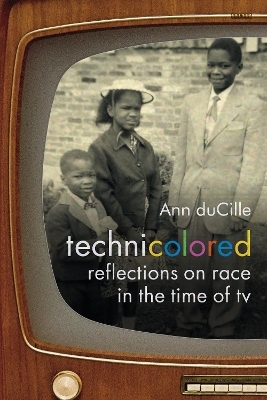
Technicolored
Duke University Press (Verlag)
978-1-4780-0039-6 (ISBN)
From early sitcoms such as I Love Lucy to contemporary prime-time dramas like Scandal and How to Get Away with Murder, African Americans on television have too often been asked to portray tired stereotypes of blacks as villains, vixens, victims, and disposable minorities. In Technicolored black feminist critic Ann duCille combines cultural critique with personal reflections on growing up with the new medium of TV to examine how televisual representations of African Americans have changed over the last sixty years. Whether explaining how watching Shirley Temple led her to question her own self-worth or how televisual representation functions as a form of racial profiling, duCille traces the real-life social and political repercussions of the portrayal and presence of African Americans on television. Neither a conventional memoir nor a traditional media study, Technicolored offers one lifelong television watcher's careful, personal, and timely analysis of how television continues to shape notions of race in the American imagination.
Ann duCille is Emerita Professor of English at Wesleyan University and author of Skin Trade and The Coupling Convention: Sex, Text, and Tradition in Black Women's Fiction.
Acknowledgments ix
Introduction. Black and White and Technicolored: Channeling the TV Life 1
1. What's in a Game? Quiz Shows and the "Prism of Race" 22
2. "Those Thrilling Days of Yesteryear": Stigmatic Blackness and the Rise of Technicolored TV 52
3. The Shirley Temple of My Familiar: Take Two 83
4. Interracial Loving: Sexless in the Suburbs of the 1960s 112
5. "A Credit to My Race": Acting Black and Black Acting from Julia to Scandal 134
6. A Clear and Present Absence: Perry Mason and the Case of the Missing "Minorities" 159
7. "Soaploitation": Getting Away with Murder in Primetime 183
8. The Punch and Judge Judy Shows: Really Real TV and the Dangers of a Day in Court 209
9. The Autumn of His Discontent: Bill Cosby, Fatherhood, and the Politics of Palatability 232
10. The "Thug Default": Why Racial Representation Still Matters 261
Epilogue. Final Spin: "That's Not My Food" 285
Notes 289
Bibliography 311
Index 325
| Erscheinungsdatum | 18.09.2018 |
|---|---|
| Reihe/Serie | A Camera Obscura book |
| Zusatzinfo | 64 illustrations |
| Verlagsort | North Carolina |
| Sprache | englisch |
| Maße | 152 x 229 mm |
| Gewicht | 612 g |
| Themenwelt | Kunst / Musik / Theater ► Film / TV |
| Kunst / Musik / Theater ► Theater / Ballett | |
| Geschichte ► Teilgebiete der Geschichte ► Kulturgeschichte | |
| Sozialwissenschaften ► Ethnologie | |
| Sozialwissenschaften ► Soziologie | |
| ISBN-10 | 1-4780-0039-2 / 1478000392 |
| ISBN-13 | 978-1-4780-0039-6 / 9781478000396 |
| Zustand | Neuware |
| Haben Sie eine Frage zum Produkt? |
aus dem Bereich


